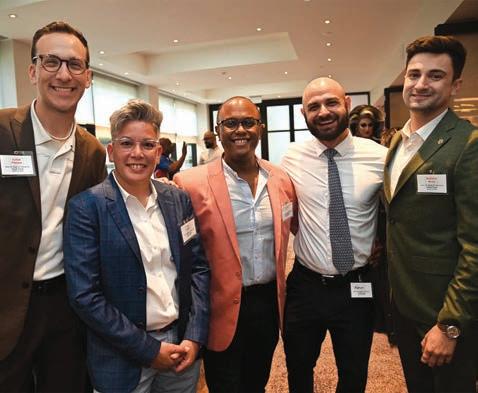Sean Kim is one of many out vendors at this weekend’s event, PAGE































































Sean Kim is one of many out vendors at this weekend’s event, PAGE































































ADDRESS PO Box 53352

Washington DC 20009
PHONE
202-747-2077
E-MAIL news@washblade.com
INTERNET washingtonblade.com
PUBLISHED BY Brown Naff Pitts Omnimedia, Inc.
PUBLISHER
LYNNE J. BROWN lbrown@washblade.com ext. 8075

EDITORIAL
EDITOR
KEVIN NAFF knaff@washblade.com ext. 8088 SR. NEWS REPORTER LOU CHIBBARO JR. lchibbaro@washblade.com ext. 8079

WHITE HOUSE CORRESPONDENT
CHRIS KANE ckane@washblade.com extg 8083
INTERNATIONAL NEWS EDITOR
MICHAEL K. LAVERS mlavers@washblade.com ext. 8093
POP CULTURE REPORTER
JOHN PAUL KING
PHOTO EDITOR
MICHAEL KEY mkey@washblade.com ext 8084
WRITERS
CONTRIBUTING
DANIEL ITAI, EDICIÓN CIENTONCE, QUORUM, WDG, STEPHANIE MONDRAGÓN, ISAAC AMEND , TINASHE CHINGARANDE, DUNIA ORELLANA, REPORTAR SIN MIEDO, PARKER PURIFOY, PETER ROSENSTEIN, MARK LEE, LATEEFAH WILLIAMS, KATE CLINTON, KATHI WOLFE, ERNESTO VALLE, YARIEL VALDÉS GONZÁLEZ, LYNARE ROBBINS, PHILIP VAN SLOOTEN, KATLEGO K. KOLANYANE-KESUPILE, KAELA ROEDER, TREMENDA NOTA, ALBERTO J. VALENTÍN, MAYKEL GONZÁLEZ VIVERO, ORGULLO LGBT. CO, ESTEBAN GUZMAN, ANDRÉS I. JOVÉ RODRÍGUEZ, WINTER HAWK CREATIVE DESIGN/PRODUCTION AZERCREATIVE.COM
SALES & ADMINISTRATION
DIRECTOR OF SALES & MARKETING











STEPHEN RUTGERS srutgers@washblade.com ext. 8077


SR. ACCT. EXECUTIVE BRIAN PITTS
bpitts@washblade.com ext. 8089
CLASSIFIED ADVERTISING/ADMINISTRATION


PHILLIP G. ROCKSTROH prockstroh@washblade.com ext. 8092
NATIONAL ADVERTISING
RIVENDELL MEDIA
212-242-6863; sales@rivendellmedia.com
For distribution, contact Lynne Brown at 202-747-2077, ext. 8075. Distributed by Southwest Distribution Inc.

All material in the Washington Blade is protected by federal copyright law and may not be reproduced without the written consent of the Washington Blade. The sexual orientation of advertisers, photographers, writers and cartoonists published herein is neither inferred nor implied. The appearance of names or pictorial representation does not necessarily indicate the sexual orientation of that person or persons. Although the Washington Blade is supported by many fine advertisers, we cannot accept responsibility for claims made by advertisers. Unsolicited editorial material is accepted by the Washington Blade, but the paper cannot take responsibility for its return. The editors reserve the right to accept, reject or edit any submission. A single copy of the Washington Blade is available from authorized distribution points, to any individual within a 50-mile radius of Washington, D.C. Multiple copies are available from the Washington Blade office only. Call for rates. If you are unable to get to a convenient free distribution point, you may receive a 52-week mailed subscription for $195 per year or $5.00 per single issue. Checks or credit card orders can be sent to Phil Rockstroh at prockstroh@ washblade.com. Postmaster: Send address changes to the Washington Blade, PO BOX 53352 Washington, DC 20009. The Washington Blade is published weekly, on Friday, by Brown Naff Pitts Omnimedia, Inc. Rates for businesses/institutions are $450 per year. Periodical postage paid at Washington, D.C., and additional mailing offices. Editorial positions of the Washington Blade are expressed in editorials and in editors’ notes as determined by the paper’s editors. Other opinions are those of the writers and do not necessarily represent the opinion of the Washington Blade or its staff. To submit a letter or commentary: Letters should be fewer than 400 words; commentaries should be fewer than 750 words. Submissions may be edited for content and length, and must include a name, address and phone number for verification. Send submissions by e-mail to knaff@ washblade.com.

202.882.1648










A trial in federal court in Tallahassee, Fla., began on Monday, April 17, for Sharon Lettman-Hicks, the CEO and board chair of the D.C.-based LGBTQ group National Black Justice Coalition, and former Tallahassee mayor and unsuccessful Florida gubernatorial candidate Andrew Gillum.
The trial began about 10 months after a federal grand jury in the Northern District of Florida on June 7, 2022, handed down an indictment charging both Gillum and Lettman-Hicks, who served as a campaign adviser to Gillum, with conspiracy and multiple counts of fraud.
The indictment alleged that Lettman-Hicks and Gillum engaged in an illegal political corruption scheme that began in 2015. It says Lettman-Hicks allegedly helped Gillum improperly funnel money solicited from FBI agents posing as real estate developers with a promise of providing something “very significant in return” for Gillum’s support for the developers in his role at the time as mayor of Tallahassee.
The indictment said much of the money Gillum received from the FBI sting operation went for his personal use through a company Lettman-Hicks operated called P&P communications. It charges both Gillum and Lettman-Hicks with 19 counts of wire fraud and one count of attempt and conspiracy to commit mail fraud.
The Tallahassee-based TV news station WCTV reports that last week, on April 11, prosecutors announced they had obtained a new superseding indictment against Lettman-Hicks and Gillum that includes two fewer charges
of wire fraud against the two than the previous indictment. WCTV reports the charges that were dropped both involved wire transfers of $66,250 from “Organization E” to Lettman-Hicks’ company P&P Communications.
Lettman-Hicks and Gillum, who identifies as bisexual, have strongly denied the allegations against them, calling them politically motivated by Republican politicians who dominate the political landscape in Northern Florida.
At the time the first indictment was handed down, Lettman-Hicks, who is based in Tallahassee, had qualified as a Democratic candidate running for a seat in the Florida State House. She immediately withdrew her candidacy after the indictment was issued.
“I am devastated by these baseless charges, and I have made the painful decision to suspend my campaign,” she said in a press release reported by the Tallahassee Democrat newspaper. “I must now focus on fighting for my continued freedom,” she said in the release.
Legal observers have pointed out that the FBI’s political corruption investigation that led to Lettman-Hicks and Gillum’s indictment began in 2015 during the Obama administration, which was in charge of appointing the
federal prosecutors involved in the case. Some observers note that Florida state prosecutors associated with the GOP-controlled state government do not appear to have been involved in the case.
Lettman-Hicks was listed this week on the National Black Justice Coalition website as the organization’s CEO and board chair. The website says she served as the group’s CEO and executive director from 2009 to 2017, when she stepped down as executive director. It says she has been based in Tallahassee during her tenure with the NBJC.

David John, the current NBJC executive director, is based in the organization’s headquarters in D.C.

A spokesperson for the NBJC did not respond to a request on Monday for comment on Lettman-Hicks’ trial that began on Monday.
On its website, NBJC says it has served since its founding in 2003 as “America’s leading national civil rights organization dedicated to the empowerment of Black, lesbian, gay, bisexual, transgender, queer+, and same-gender loving (LGBTQ+/SGL) people, including people living with HIV/AIDS through coalition building, federal policy change, research, and education.”
A unique D.C. Pride Prom open to LGBTQ students attending high schools throughout the city is scheduled to take place on Saturday, May 13, at the Corner At Whitman-Walker, an event facility in Northwest Washington that the LGBTQ supportive Whitman-Walker Health is providing for the event free of charge.
“The goals of the event are to create a safe and joyous space for queer D.C. students, build relationships across schools, and thereby to support student mental health and activate broader community engagement,” according to a statement released by student and adult organizers of the event.
Additional information released by organizers says the event is free and is limited to students between the ages of 16 and 19.
“Due to space limitations, only 100 students will be able to attend,” a separate statement issued by organizers says. “Chaperones will be at Pride Prom to oversee the conduct and welfare of student participants,” it says.
Among the lead organizers of the D.C. Pride Prom are high school seniors Diya Bardwell and Liv Birnstad along with gay D.C. State Board of Education member Allister Chang.
At Chang’s initiative, the education board approved an official resolution endorsing the Pride Prom as an event “supporting LGBTQ+ youth by uplifting inclusive and welcoming spaces and promoting events” like the Pride Prom.
In a separate statement, the Montgomery County, Md., LGBTQ organization called the MoCo Pride Center says it is organizing a MoCo Pride Prom scheduled for Friday, May 12, at a location yet to be announced.
“Starting in 2016 with modest beginnings, the MoCo Pride Prom is now an event the local students look forward to each year,” the statement says. “The MoCo Pride Prom is open to high school-aged and community college students in the local area who want to proudly attend prom, dress however they are most comfortable, and dance –without fear – with whomever they choose,” the statement says.
“The evening will consist of a live DJ spinning popular music, along with giveaways, a raffle and local catering – all at a nominal ticket price,” the statement continues. “The event is funded through efforts from direct donations, fundraising, and corporate sponsorships,” it says.
A spokesperson for the MoCo Pride Center couldn’t immediately be reached to determine whether an age limit was set for attendees of the Pride Prom since community
colleges usually accept students of all ages.
The D.C. Pride Prom lead student organizers Diya Bardwell, who lives in Ward 7, and Liv Birnstad, who lives in Ward 1, told the Washington Blade in a joint statement that similar to the Montgomery County event, the D.C. Pride Prom will include a DJ and dancing as well as a possible photo booth among other features depending on the available funds to cover the cost.
The two said organizers set up a GoFundMe page to raise funds for the Pride Prom and have asked potential supporters to also contact them directly by email to make arrangements for a donation.
“As a queer student, I have often felt like I do not have a community of other LGBTQ+ students or educators around me,” Bardwell said. “I hope that Pride Prom can be a safe space for all LGBTQ+ youth to experience not only a prom that celebrates who they are, but a community of people who celebrate all of the love and joy of being queer,” she said.
Birnstad said the D.C. Pride Prom is important to her because it will allow LGBTQ students to come together to have fun rather than just engage in advocacy related activities.
“A lot of the times when we come together it’s to talk about our struggles or to talk about ways we can combat homophobia, but this is a night where we get to just kind of relax and be normal teenagers, and I think that that is super, super special,” she told the Blade.









After Virginia Gov. Glenn Youngkin’s administration proposed changes to transgender students’ rights in September 2022, 72,000 public comments flooded in. But with no indication of when policies that restrict bathroom use and pronoun preference could be implemented, some students in Virginia public schools are afraid of losing their safe spaces at school.
“Many students have reported increased anxiety and fears related to the model policies’ ramifications,” said Abram Clear, the school programs coordinator for Side by Side, an organization working with schools across Virginia to support LGBTQ youth. “In particular, trans and nonbinary students who have found safe, affirming spaces at school have expressed concerns about being forcibly outed to their guardians.”
While some guardians openly support their student’s sexuality, other discussions about gender identity can be dismissed or misunderstood at home. If the new policies on transgender students are passed and educators are required to out students to their guardians, LGBTQ students can run a higher risk of negative mental health, as well as possible physical danger at home.
Transgender and nonbinary students also worry that these policies embolden educators who are already dismissive of their identities. Supportive educators express similar concerns as they worry they will be contractually obligated to out students or enforce measures that harm their students.
“Morally, they feel it’s imperative to continue affirming their trans and nonbinary students by using their requested names and pronouns, regardless of documentation,” said Clear. “But this would be at odds with the 2022 [Virginia Department of Education] protocols.”
Virginia’s proposed policies would require more than one million students to only use bathrooms and locker rooms associated with the sex assigned to them at birth. Students would also only be allowed to participate in sports or extracurricular activities in accordance with the
same rule.
The legal name and sex of a student would also have to align with their sex at birth unless official legal documents or court orders are provided, regardless of whether a parent gives permission. This would require teachers and other school officials to only refer to a student by the pronouns associated with their sex at birth.
In one month alone, nearly one-third of LGBTQ students missed at least one day of school because they felt unsafe, according to the Gay, Lesbian, and Straight Education Network’s 2021 report. Just over 75% of LGBTQ youth also experienced in-person verbal harassment at school in the past year due to their sexual orientation, gender expression, and gender identity.
But as students in Virginia try to unpack the potential ramifications of changes to the 2022 Virginia Department of Education’s Model Policies, D.C. Public Schools (DCPS) continues to push for visible allyship in middle and high schools.
Each year, DCPS distributes a survey to middle and high school students to ask about gender identity and sexuality. Asking students to best describe their identity, DCPS uses the survey to learn about student perceptions of themselves to improve school climate and social-emotional learning.
DCPS policies on transgender and non-confirming students also advise school-based staff to be aware of student identification preferences and always use their preferred reference when speaking to or about the student.
Staff in DCPS can even become trained LGBTQ Liaisons, wherein they offer visible allyship and resources to students and families. Also tasked with developing and running a Gender and Sexuality Alliance (GSA) in their school, liaisons work to raise awareness of LGBTQ issues in their school community.
A strong GSA presence in schools offers a consistent space for LGBTQ students to discuss their experiences with peers and trusted advisers. The Duke Ellington
School of the Arts, for instance, gathers weekly during lunch or advisory periods to discuss current issues and plan community-building initiatives.
With more than 60% of queer youth living in non-affirming homes, the presence of GSAs has shown to increase the academic performance of LGBTQ-identified youth, decrease bullying, and create a more inclusive school culture.
“Holding a consistent, brave space for LGBTQ+ students to gather can be transformative for a school’s environment,” Clear said. “GSA meetings may be one of the only safe spaces LGBTQ+ students have to fully express themselves and build community, which is especially crucial if they lack familial support.”
Side by Side is concentrating efforts in the greater Richmond, Va., area to connect more than 25 GSAs at middle and high schools. But GSAs aren’t run in every middle and high school in the state, so the challenge to offer affirming in-school club spaces remains a priority as the state faces potential changes to students’ rights.
“In particularly homophobic and transphobic school environments, LGBTQ+ students may not have any trusted adults to advise and sponsor the club,” Clear added. “Unfortunately, this creates a barrier in schools where student access to a GSA may be most crucial.”
GSAs in public schools are protected under the Federal Equal Access Act. However, for transgender and non-binary youth, assurance that school is a safe and affirming place for them may change.
Former Maryland Gov. Larry Hogan has criticized Florida Gov. Ron DeSantis over his state’s so-called “Don’t Say Gay” law he signed last year.

The law, the Parental Rights in Education Act, limits discussion in classrooms about sexual orientation and gender identity while also restricting student privacy rights when confiding with school counselors or administrators about these topics. The Republican-controlled Florida Legislature is also considering a bill that would prevent children from attending drag shows.
Hogan on Sunday told CNN’s “State of the Union” the ‘Don’t Say Gay’ law is an “absurd” form of legislation.
The former Maryland governor also criticized DeSantis for publicly arguing with the Walt Disney Company over the ‘Don’t Say Gay’ law. This is a rare occasion in which elected members of different states, but the same party, openly criticize the inner workings of another.

Hogan and DeSantis are both Republicans.
“I didn’t really actually see the details of the legislation, but the whole thing seems like just a crazy fight,” said Ho-
gan.
After being urged to speak out, Disney — an entertainment giant that accounts for the majority of Florida’s tourism industry — publicly condemned the legislation.
DeSantis in response said that he would be “receptive” to revoking a more than 50-year-old law that grants the Walt Disney Company the ability to self-govern its property. Disney’s vow to try and help repeal the law prompted outrage among Republican lawmakers in Florida and spurred calls to repeal the 1967 Reedy Creek Improvement Act, which gives the conglomerate the ability to govern the territory its park sits on.
Hogan said he was “concerned” with DeSantis’ use of freedom of speech, arguing how it was a double-standard perspective on a constitutional right that equally protected all sides of the political spectrum.
“We have a thing called freedom of speech. They can come out and say what they think. I think the bill was kind of absurd and not something that would have happened in our state [Maryland],” Hogan said.
Hogan has announced he will not run for president in 2024. DeSantis is expected to announce his White House bid in the coming months.





Colorado Gov. Jared Polis (D) signed a trio of healthcare bills into law Friday that will protect the reproductive rights of women and preserve gender-affirming care in the state as Republicans in surrounding states have taken action to severely limit those rights.

The three pieces of legislation signed by the governor; SB23-188 Protections for Accessing Reproductive Health Care; SB23-189 Increasing Access to Reproductive Health Care; SB23-190 Deceptive Trade Practice Pregnancy-Related Service, are all structured to ensure people in surrounding states and beyond can go to Colorado to have an abortion, begin puberty blockers or receive gender-affirming surgery without fear of prosecution.
Colorado now joins its neighboring state to the South, New Mexico, in protecting abortion care and gender-affirming care. However the bordering states of Wyoming and Oklahoma have passed abortion bans, while Utah has severely restricted transgender care for minors.
In January, labeling Senate Bill 16 “a nuanced and thoughtful approach to a terribly divisive issue” Utah’s Re-
publican Governor Spencer Cox signed the bill into law. SB16 will take affect in May that will ban most gender-affirming health care for transgender youth.
New Mexico Governor Michelle Lujan Grisham on March 16, signed into law House Bill 7, the Reproductive and Gender-Affirming Health Care Act, which prohibits public bodies, including local municipalities, from denying, restricting, or discriminating against an individual’s right to use or refuse reproductive health care or health care related to gender.
In signing the trio of bills on Friday, Governor Polis said: “Here in Colorado, we value individual freedoms, and we stand up to protect them. Last year we took an important step to protect the right to choose how and when to start a family. Today, we are building on those protections by: Codifying the Executive Order I issued last year ensuring healthcare professionals are safe to provide legal healthcare services; Expanding access to reproductive healthcare services in both commercial insurance and Medicaid; And protecting consumers from harmful practices and
false advertising by organizations and providers regarding reproductive health services. I’m proud to sign these bills today to further Colorado’s reputation as a beacon of freedom and choice.”
The U.S. Supreme Court on Friday temporarily suspended orders from the U.S. District Court for the Northern District of Texas and the U.S. Court of Appeals for the 5th Circuit that would have restricted the nationwide sale and distribution of the abortion medication mifepristone.
The move by conservative Justice Samuel Alito will give the High Court until Wednesday April 19 to decide whether those restrictions will be kept in place pending the outcome of litigation over the case, Alliance for Hippocratic Medicine v. U.S. Food and Drug Administration, which is now on appeal before the 5th Circuit.
Last week, Judge Matthew Kacsmaryk of the U.S. District Court for the Northern District of Texas issued a stay of the
FDA’s approval of mifepristone 23 years ago, effectively barring its sale and distribution nationwide.
On appeal, the 5th Circuit ruled late Wednesday night that access to the drug would be restricted, though not banned entirely, pending the outcome of the case.
But for the Supreme Court’s decision on Friday, which effectively preserves the status quo until next Wednesday, access to mifepristone would have required multiple doctors visits while telehealth consultations and mail order prescriptions would have been excluded.
Medication abortions account for more than half of all abortions performed each year in the United States. Mifepristone was first approved by the FDA in 2000, and the drug
has since been proven safe and effective over more than two decades.
The Biden-Harris administration joined many legal observers in objecting to Kacsmaryk’s ruling, which these stakeholders considered an unlawful circumvention of the FDA’s Congressionally ordained power to evaluate the safety and efficacy of medications.
Kacsmaryk does not have formal training in science or medicine. Shortly after his ruling, 200 pharmaceutical industry executives issued an open letter arguing the move had cast such uncertainty around the drug approvals process that pipelines for new drug discovery would be threatened.
CHRISTOPHER KANERepublican Missouri Attorney General Andrew Bailey issued an “emergency rule” last week that severely restricts access to guideline-directed gender-affirming healthcare for minors as well as adults in the state.
The rule was made under the Missouri Merchandising Practices Act and is slated to take effect on April 27 after paperwork is filed with the Missouri Secretary of State’s office.
The state’s American Civil Liberties Union chapter and Lambda Legal promised to take “any necessary legal action” in a joint statement released hours after the rule was made public.
“The attorney general’s so-called emergency rule is based on distorted, misleading and debunked claims and ignores the overwhelming body of scientific and medical evidence supporting this care as well as the medical experts and doctors who work with transgender people every day,” the groups wrote.
Bailey’s restrictions go further than most anti-transgender policies that have been implemented in other conservative states, for example by requiring patients of all ages to complete 15 hourly sessions with a mental health professional over the course of 18-months and have a diagnosis of gender dysphoria for three “most recent, consecutive years” before treatment with puberty blockers, hormones or gender-transition surgery.
Trans Missourians with autism would be barred from accessing gender-affirming care, while those diagnosed with anxiety or depression would have to resolve those conditions beforehand. Patients who receive care would be required to
complete 15 years of follow-ups.
As activist and legislative researcher Erin Reed pointed out in her newsletter on the rule, “Many transgender people suffer from depression or anxiety before transitioning and gender-affirming care is the most effective treatment.”
Additionally, “To delay gender affirming care for three years for transgender adults is exceptionally cruel,” Reed wrote. “Most gender affirming care in America is done according to WPATH standards via informed consent and no forced waiting period.”
Shannon Minter, legal director of the National Center for Lesbian Rights, urged his followers to call Republican Missouri Gov. Mike Parson to demand a rescission of the attorney general’s order.
Full statement by national LGBTQ Legal Groups condemning Missouri action barring healthcare for transgender people:
“Today, Missouri Attorney General Andrew Bailey issued an Emergency Rule regarding the medical treatment of transgender people. Lambda Legal, the American Civil Liberties Union (ACLU), the National Center for Lesbian Rights (NCLR), Human Rights Campaign (HRC), and GLBTQ Advocates and Defenders (GLAD) issued the following statement.
“As national legal groups who represent LGBTQ people and their families in every state across this country, we condemn the lawless action of Missouri’s Attorney General in purporting to bar essential medical care for both transgender adolescents and adults.
“This action by Missouri’s Attorney General crosses a red
line that should strike fear in the heart of every person who values individual liberty and believes that individuals, not government officials, should make health care decisions for their children and themselves.
“This is a dangerous and unprecedented escalation in the assault on evidence-based health care for transgender people. Cutting off treatment for those who need it will create predictable, unnecessary, and serious harm. It is also a blatant attempt to strip transgender people of equal protection under the law and to subject them to intrusive government surveillance and control.
“We wish to make unequivocally clear that we will challenge this and any similar attempt to interfere with the fundamental freedom of transgender people to obtain medically necessary care and to be treated as equal, respected, and participating members of our democracy.
“Lambda Legal and the ACLU of Missouri are prepared to fight back in court and have announced their intention to take legal action against this order.
“At this critical moment for our nation, we call on all freedom-loving people to join us in condemning this dangerous abuse of government power and to affirm that every person in this country is of equal value and worth and has an equal right to freedom from governmental coercion and tyranny. Transgender people are part of our communities, and we will not tolerate this or any other attempt to deny them the freedom to control their own lives and make decisions about their own medical care.”
CHRISTOPHER KANE BRODY LEVESQUEWhether you are looking for a vibrant and spirited Independent Living lifes le, an enriching Assisted Living and Memo Support neighborhood, or the peace of mind and securi that comes with a Life Plan Communi , Ingleside will exceed your expectations . Discover a rich and diverse communi made up of interesting iends and neighbors, living an active and engaging lifes le.
EXPECT MORE AT INGLESIDE.

INGLESIDE AT ROCK CREEK 202-999-4496 // www.ircdc.org
INGLESIDE AT KING FARM 240-414-8523 // www.ikfmd.org
The billboard truck is back. Hired by GLAAD, the vehicle blasting neon messages criticizing the New York Times for its coverage of the transgender community returned to the newspaper’s Manhattan headquarters Monday.

The LGBTQ media advocacy organization leads a coalition of more than 100 advocacy groups, trans journalists and allies demanding the paper’s editors and leadership “stop printing biased, anti-trans stories,” meet with members and leaders in the trans community, and hire at least four trans writers and editors as full-time members of its staff.
Although the Washington Blade received a response from Charlie Stadtlander, the director of external communications for the Times, following the first protest on Feb. 15, GLAAD’s president and CEO says the newspaper has yet to respond to an open letter released on that date, or to its demands.
“It is outrageous and disrespectful that New York Times leadership continues to ignore the voices of trans community leaders, who have been sounding the alarm about the newspaper’s irresponsible, inaccurate coverage for over a year,” said Sarah Kate Ellis in a statement to the Blade. “Trans people deserve to be respected and have their voices heard. Mainstream media publications, including the Times, have a responsibility to their readers to cover trans people and issues in a fair, accurate and inclusive way.
“Our coalition of more than a hundred organizations and leaders asked that the Times meet with trans community leaders within two months. Two months have come and gone without a word from the Times. What are they afraid of?” said Ellis. “It is beyond unacceptable for the Times to use sensational, inaccurate stories about trans people for clicks, yet refuse to speak with leaders in the trans community.”
GLAAD’s coalition letter was released the same day as another letter co-authored by contributors to the newspaper. ”Some of us are trans, nonbinary, or gender nonconforming, and we resent the fact that our work, but not our person, is good enough for the paper of record. Some of us are cis, and we have seen those we love discover and fight for their true selves, often swimming upstream against currents of bigotry and pseudoscience fomented by the kind of coverage we here protest.”
“I am forever inspired by how generous and courageous NYT contributors and employees involved with the letter have given of their time, energy, heart and belief of potential that our media landscape can serve as a catalyst for change,” said one of the signatories, writer and activist Raquel Willis. “I am also grateful for the numerous organizations that have bolstered the efforts of our journalists in a time when not just facts, but
empathy continues to be left on the cutting room floor.”
“I have tracked 430 bills targeting the trans community this year, and I have seen New York Times articles referenced in numerous hearings,” said journalist and researcher Erin Reed. Just last week, Missouri’s attorney general cited a Times article in banning gender affirming care for all transgender people, including adults.
“Accurate and sensitive coverage from the New York Times is of paramount importance,” said Reed. “They need to hire more trans staff, allow trans people to cover the biggest stories that relate to our care, and take responsibility for ensuring their coverage is respectful and accurately portrays the scientific consensus around gender affirming care. I hope to see a real commitment to engaging with the community in the coming days.”
“Their reporting on the transgender community has been anything but accurate and fair,” said Jay Brown, HRC’s senior vice president for programs, research and training. “Gender affirming medical care is widely supported by every major medical association — representing more than 1.3 million doctors — but they’re platforming anti-trans extremists whose only goal is to push us all back into the closet. They aren’t experts and shouldn’t be treated as such. This isn’t a matter of giving equal time to two sides of an issue. It’s about giving radicals a platform that has been used by politicians to harm transgender people — and trans youth in particular. The Times must do better and they should listen to those of us who are transgender when we are telling them their reporting is dangerous.”
In his Feb. 15 statement emailed to the Blade, Stadtlander had this to say in response to the coalition, the open letter and the protest:
“We received the open letter delivered by GLAAD and welcome their feedback. We understand how GLAAD and the co-signers of the letter see our coverage. But at the same time, we recognize that GLAAD’s advocacy mission and the Times’s journalistic mission are different.
“As a news organization, we pursue independent reporting on transgender issues that include profiling groundbreakers in the movement, challenges and prejudice faced by the community and how society is grappling with debates about care.
“The very news stories criticized in their letter reported deeply and empathetically on issues of care and well-being for trans teens and adults. Our journalism strives to explore, interrogate and reflect the experiences, ideas and debates in society — to help readers understand them. Our reporting did exactly that and we’re proud of it.”
DAWN ENNISMore than 170,000 people attended the annual Miami Beach Pride parade that took place on the city’s Ocean Drive last Sunday.
The parade took place against the backdrop of the Republican Gov. Ron DeSantis-backed expansion of the state’s “Don’t Say Gay” law and banning gender-affirming care for transgender children in the state. The Republican-controlled Florida Legislature is also considering a bill that would prevent children from attending drag shows.

Equality Florida and the Florida Immigrant Coalition last week issued a travel warning for the state.
“As an organization that has spent decades working to improve Florida’s reputation as a welcoming and inclusive place to live work and visit, it is with great sadness that we must respond to those asking if it is safe to travel to Florida or remain in the state as the laws strip away basic rights and freedoms,” said Equality Florida Executive Director Nadine Smith.
State Rep. Fabián Basabe (R-Miami Beach) is among those who participated in the Miami Beach Pride parade. Protesters confronted the Miami Beach Republican over his support of anti-LGBTQ bills in the Florida House of Representatives.
YARIEL VALDÉS GONZÁLEZ














A group of LGBTQ and intersex activists from Uganda traveled to D.C. last week.
Sexual Minorities Uganda Executive Director Frank Mugisha, GLBTQ Legal Advocates and Defenders Senior Manager of Organizational Culture and Community Partnerships
Quin Mbabazi and Chapter Four
Uganda Executive Director Nicholas Opiyo on Monday spoke about the country’s Anti-Homosexuality Act 2023 at the Center for Strategic and International Studies in D.C. Maria Burnett, senior associate of CSIS’ Africa Program, moderated the panel discussion in which Jessica Stern, the special U.S. envoy for the promotion of LGBTQ and intersex rights rights, also participated.
Mugisha, Mbabazi, Opiyo and Jacqueline Kasha Nabagesara while in D.C. met officials from the White House, the State Department and the U.S. Agency for International Development and representatives from the Council for Global Equality. The activists also briefed the Congressional Equality Caucus.
Assistant Health Secretary Rachel Levine, a four-star admiral in the U.S. Public Health Service who is the first openly transgender person confirmed by the U.S. Senate, on Thursday tweeted a picture of her with Mugisha.
“It was such an honor to meet (Frank Mugisha.) His courage gives me strength, but no one should have to be brave just to be their authentic self,” tweeted Levine. “Progress is not real unless it means progress for all.”
The activists came to D.C. less than a month after Ugandan MPs passed the Anti-Homosexuality Act.
Opiyo notes the measure would impose a “mandatory” death penalty for “aggravated homosexuality” and “anybody who is convicted of being engaged in same-sex relations” would face life in prison.
The bill would also punish the “promotion, recruitment and funding” of LGBTQ-specific activities in Uganda with
up to 10 years in prison. Any “person who ‘holds out as a lesbian, gay, transgender, a queer or any other sexual or gender identity that is contrary to the binary categories of male and female’” would also face up to 10 years in prison. Opiyo also noted the measure’s provision that would require Ugandans to report LGBTQ-specific activities to authorities would create “a moral police force.”
Uganda is among the dozens of countries in which consensual samesex sexual relations are criminalized.
President Yoweri Museveni in 2014 signed that year’s Anti-Homosexuality Act, which imposed a life sentence upon anyone found guilty of repeated same-sex sexual acts. The law was known as the “Kill the Gays” bill because it previously contained a death penalty provision.
The U.S. subsequently cut aid to Uganda and imposed a travel ban against officials who carried out human rights abuses. Uganda’s Constitutional Court later struck down the 2014 Anti-Homosexuality Act on a technicality.
Museveni has said he supports the current bill for which MPs with close ties to anti-LGBTQ American evangelical groups have championed.
“Anti-gay groups and anti-gender groups (are) radicalizing the Ugandan society against the LGBTQ community,” said Mugisha during the CSIS panel. “We’re seeing a lot of hatred. We’re seeing a lot of fear of LGBTQ persons.”
Mugisha noted there has been an increase in violence against LGBTQ and intersex Ugandans over the last year. Uganda’s National Bureau for Non-Government Organizations last August forced Sexual Minorities Uganda to shut down.
“We’re seeing a very systematic, targeted, group that is targeting the LGBTQ community and we’ve seen that Ugandans have sort of been prepared for this legislation,” said Mugisha.
Stern during the CSIS panel reiterated the Biden-Harris administration’s criticisms of the Anti-Homosexuality Act.
“The U.S. has significant concerns about the Anti-Homosexuality Act that the Parliament of Uganda passed on March 21,” said Stern. “If the Anti-Homosexuality Act is signed into law and enacted, it would threaten the human rights of Ugandan citizens, jeopardize progress in the fight against HIV/AIDS, deter tourism and investment in Uganda and damage Uganda’s international reputation.”
White House Press Secretary Karine Jean-Pierre during her March 22 press briefing reiterated many of the same points that Stern did. National Security Council spokesperson John Kirby that day also noted the U.S. provides substantial aid to Uganda through the U.S. President’s Emergency Plan for AIDS Relief and other programs.
“If this bill passes as it is now, the work that PEPFAR currently funds would be criminalized,” said Burnett. “We’re talking about people who are implementing U.S.-funded programs who could not do their jobs without potentially running afoul of the law and losing their liberty.”
Stern said the U.S. “continues to raise issues around the Anti-Homosexuality Act with the government of Uganda at all levels” and is “coordinating with diplomatic partners, with the private sector and with human rights organizations directly.” Stern also noted she and her colleagues are in “daily communication” with Mugisha and the other activists who were on the CSIS panel.
“We’re in constant contact with the community because they know how severe this issue is, how high the stakes are, how to push, what messages to use and what consequences the threat of the bill is already having on the community,” said Stern. “LGBTQI human rights defenders and human rights defenders of all stripes in Uganda are some of our greatest partners in this work. We are working with partners to engage at the multilateral level to address this issue.”
Stern also warned the U.S. would reconsider foreign assistance to Uganda if Museveni signs the Anti-Homosexuality Act.
MICHAEL K. LAVERSThe Indian Supreme Court on Tuesday began to hear arguments on whether to extend marriage rights to same-sex couples.
The Supreme Court in 2018 struck down the country’s colonial-era law that criminalized consensual same-sex sexual relations.
Ankush Kumar, a Washington Blade contributor in India, reported Mukul Rohatgi, an LGBTQ and intersex
activist, said the “LGBTQ community possess (the) same human rights as (a) heterosexual person.”
“So they have right to marry and can not be left alone,” said Rohatgi. “So we request this court to grant us relief.”
The Blade previously reported the government opposes legal recognition of same-sex marriage and has told the highest court that same-sex couples living together as partners and having a sexual relationship with the
same sex individual is not comparable with Indian family unit — a husband, a wife and a child born out of the union. The government also told the Supreme Court that samesex marriage is not compatible with the Indian ethos and morality.
Kumar reported the Supreme Court said the “notion of a biological man or woman is not absolute.”
MICHAEL K. LAVERSThe National Assembly of Hungary last week approved legislation that included a provision for citizens to anonymously report on same-sex couples who are raising children.
The wording of the provision specifies that Hungarians may report those who contest the “constitutionally recognized role of marriage and the family” and those who contest children’s rights “to an identity appropriate to their sex at birth.” The latter wording specifically aimed at acknowledging transgender youth.
The country’s constitution states that the institution of marriage is “between one man and one woman,” and notes that “the mother is a woman, the father a man.”
This law’s passage comes after the country’s Constitutional Court issued a ruling in February that will continue to block
new applications from trans people for legal gender recognition. The judgment effectively creates two categories of trans people in Hungary: Those who applied early enough to pursue gender recognition and those who did not.
Earlier this month according to a spokesperson for the German government, Germany and France joined with other EU member states in the European Commission lawsuit over a Hungarian law which discriminates against people on the basis of their sexual orientation and gender identity.
The 14 EU member states that have joined the lawsuit’s proceedings are Belgium, the Netherlands, Luxembourg, Denmark, Portugal, Ireland, Spain, Malta, Austria, Sweden, Slovenia, Finland and now France and Germany.
Nationalist Hungarian Prime Minister Viktor Orban has publicly proclaimed he is a “defender of traditional family Catholic values.” Orban has been criticized by international human rights groups as discriminating against LGBTQ people with this law which European Commission President Ursula von der Leyen called a “disgrace.”
On June 15, 2021, the Hungarian Law purportedly aiming at taking stricter action against pedophile offenders and amending certain laws to protect children was adopted. Some of the new provisions target and limit the access of minors to content and advertisements that “promotes or portrays” the so-called “divergence from self-identity corresponding to sex at birth, sex change or homosexuality.”
BRODY LEVESQUE




































Wed & Thu, April 26 & 27 Acrobats pushed to their physical limits, propelled by the driving sound of live percussion.









is a longtime LGBTQ rights and Democratic Party activist. He writes regularly for the Blade.




Years ago, in what now seems a distant past, there was a Republican Party still in some ways rational. Although I never agreed with its philosophy, or platform, conversation was possible. Ronald Reagan was a terrible president in so many ways. He was responsible for many deaths because of his refusal to recognize the AIDS crisis. Yet he was able to work out a deal with Democratic Speaker Tip O’Neill, to extend Social Security in 1983. I didn’t vote for him, and would never today, but it was possible to talk. That is no longer the case and it is sad.
We are seeing Republican governors in states like Florida and Texas, with legislatures in Republican hands, pass legislation attacking women, the LGBTQ community, the African-American community, and other minorities. We just saw the Tennessee Legislature vote out two Black legislators who stood up for gun control. We saw a Trump-appointed U.S. District Judge, Matthew Kacsmaryk, in Amarillo, Texas, rule to stop women across the nation from getting mifepristone. That drug, when followed by misoprostol, is used to terminate a pregnancy within the fi rst 10 weeks. That method accounts for more than half of U.S. abortions.
We are seeing MAGA Republicans in Congress attempt to hold the nation hostage to their whims by threatening to not approve an increase in the debt ceiling. They have said they have no issue with bringing down the nation’s economy to get their way. I still have some Republican friends, they are not MAGA Republicans, and one of them recently asked if I would vote for a moderate Republican. My response was, “that is not a question that should be directed at me. Rather it should be directed at Republican primary voters.” A moderate, even a semi-rational Republican, can’t win a Republican primary. So, asking me the question is a moot point. I suggested he go to those Republicans voting in Marjorie Taylor Greene’s district in Georgia and ask them how they can vote for a total moron. Greene, who has now gone on twitter “to defend Air National Guardsman Jack Teixeira, who was arrested Thursday over his alleged role in leaking Pentagon fi les. She said “Jake Teixeira is white, male, Christian, and antiwar. That makes him an enemy to the Biden regime.” Remember, she won her district by 31%.

There are Democrats who some consider crazy. But the ‘crazies’ in the Democratic Party don’t control it. They have a say and can try to infl uence it, but they don’t control the Democratic Party like the crazies in the Republican Party control their party. There are conservative Democrats like Sen. Joe Manchin (D-W. Va.) and left-wing ones like congresswoman Alexandria Ocasio-Cortez (D-N.Y.). But when it comes down to it, they both vote for their party leadership. House Democrats don’t need 15 ballots to elect a speaker. They fi ght over bills, but when it comes to cultural issues, they tend to speak out in favor of legislation to benefi t women, the LGBTQ and African-American communities, and other minorities. At least they don’t try to move them back into the Stone Age.
So the time has come for Democrats and clear-thinking independents, to get together and focus on defeating every Republican running for offi ce at the federal level and in states so they no longer control a state legislature or governor’s mansion. While calling for this I am smart enough to understand it won’t happen to the degree I want. Redistricting has made some changes impossible.

But if the Democratic Party fi nds moderate candidates to run in moderate districts, and the general electorate is moderate, we might be able to defeat enough Republicans to make a difference. One example is supporting Adam Frisch against Lauren Boebert (R-Colo.). He came within 500 votes of defeating her in 2022 and is running again in 2024. He can win and we can win in other close Districts, with the right candidates and unifi ed support for them.

Defeating every Republican should be the goal in 2024
We need the right candidates and unified support












is founder and e ecutive director of ld Pros a non profit media or ani ation creating the conditions to change the status of sex workers. She is also the host of The Oldest Profession Podcast and is currently workshopping, ‘Whore’s Eye View,’ a 75-minute mad dash through 10,000 years of history from a sex worker’s perspective.




Sex workers are advocating for the reduction of criminal penalties for prostitution and the expansion of sex worker rights in at least a dozen states, including here in D.C., on local and national levels. Last year, both New York and California voted to stop arresting people for “loitering for the purposes of prostitution” and citizens in Burlington, Vt., and Seattle, voted to remove laws criminalizing sex work. Today, legislators in Vermont, Washington, Hawaii, New York, and Oregon are all considering bills that would decriminalize adult, consensual, sex work. This is an emergent issue.

It’s tempting to compare the legalization of marijuana in dozens of states across the country with the accelerating effort to decriminalize sex work. But the legalization of marijuana and the subsequent creation of licensing and regulatory structures cannot be replicated to contain or control the oldest profession. Sex workers are service providers, not commodities. Sex workers are asking for decriminalization, not legalization. It’s important to know the difference.
Decriminalization removes criminal penalties that criminalize adult consensual sex work but it does not remove criminal penalties for rape, trafficking, assault, kidnapping, or any other violent crime. Decriminalizing sex work would prevent arrests, evictions, job loss, and the loss of child custody just because someone is engaged in sex work. Decriminalization is the only policy that promotes human rights and reduces violence against sex workers. This policy is endorsed by many organizations, including Amnesty International, The World Health Organization, ACLU, the United Nations, Human Rights Watch, and the Freedom Network. Legalization, on the other hand, creates restrictive regulations that seek to keep registered sex workers in legally licensed brothels. These laws give a monopoly to brothel owners, disempower workers, while doing nothing to reduce exploitation or arrests. Regulations like licensing create a two-tiered system where the overwhelming majority of people working outside of brothels are still criminalized and therefore have no legal protections. This is the model you see in Nevada, the only state with legal, regulated prostitution is also the state with the highest arrest rate per capita for prostitution related offenses. Regulation is not liberation.
Most efforts to regulate erotic service providers result in overly broad policies that do more harm than good. Regulation, legalization, and licensing schemes create state sanctioned monopolies that limit the freedom of movement, association, and expression of everyone. There are good reasons why some people don’t want to put themselves on stigmatized lists. Being a former registered prostitute can come up in child custody cases, background checks, and embolden abusive partners, landlords, or employers.





We cannot regulate sex work without infringing on fundamental rights for anyone suspected of engaging in stigmatized services. Sex workers are not commodities like marijuana, or alcohol, and cannot be regulated and controlled in the way that substances or objects are. Sex workers are people, we are service providers, and — whether you know it or not — we are already an integral part of your community.
We’ve seen what prohibition does to markets. It doesn’t make them safer.
Prohibition does not make markets safer. Criminalization and regulation provide opportunities for law enforcement and government bureaucrats to interfere with the private choices of consenting adults. Decriminalizing sex work is the only legal model that keeps the government out of our bedrooms and out of our business.


We’ve seen what prohibition does to mar ets it doesn t ma e them safer


JEN BAXTER is executive director of the Balanced Veterans Network, a non-profit organization, and a thriving community of veterans and their family members, that provides education to help empower veterans to use alternative therapies to combat issues plaguing the U.S. military veterans’ community.

As a U.S. military veteran, I have seen fi rsthand how military service can take a toll on both physical and mental health. Many veterans struggle with chronic pain, PTSD, anxiety, depression, and other conditions related to their service. Despite their sacrifi ces, veterans often do not have access to a safe and effective treatment option: cannabis.
As an advocate for veterans’ rights, I believe that veterans should have access to cannabis as a viable treatment option. Cannabis has been a game-changer for many veterans, providing relief when traditional treatments have failed and enabling us to lead more fulfi lling lives.
Unfortunately, veterans are often denied access to cannabis due to the federal government’s outdated classification of it as a Schedule I drug. This classifi cation makes it diffi cult to conduct research on its medicinal properties and prevents veterans from obtaining safe, regulated cannabis. As a result, veterans are often forced to turn to prescription opioids, which can be addictive and have dangerous side effects, or self-medicate with alcohol.



Denying veterans access to cannabis not only does a disservice to them but to the American public. The opioid epidemic is rampant, and veterans are among the most vulnerable populations. By denying veterans access to cannabis, we are contributing to the problem rather than providing a solution.
Thankfully, several states have legalized cannabis for medicinal and/or recreational use, and a growing number of lawmakers are pushing for federal legalization. In fact, a recent poll found that 83% of Americans support legalizing medical cannabis, including a majority of both Democrats and Republicans.
It is time for the government to listen to the will of the people and provide veterans with safe access to cannabis. We owe it to those who have served our country to provide them with the best possible care, and that includes access to cannabis. It is time to end the stigma surrounding cannabis and recognize its potential as a safe and effective treatment option for a wide range of conditions.
In conclusion, I urge lawmakers and fellow Americans to support veterans’ access to cannabis. Let us work together to ensure that veterans have the care and support they deserve.
A game-changer providing relief when traditional treatments have failed
JOINTHEWASHINGTONBLADEANDWHITMAN-WALKERFOR ACONVERSATIONANDBOOKSIGNINGWITHBLADEEDITOR




HOSTEDBYEVANKOSLOF(WUSA9)




&DR.KELLANE.BAKER(WHITMAN-WALKER)

STEPHEN POST
is a Senior Communications Associate at Last Prisoner Project, a national, nonpartisan non-profit dedicated to cannabis criminal justice reform. We aim to release every last person incarcerated for cannabis, as well as to repair the harms of cannabis criminalization. We accomplish this through legal intervention, direct constituent support, advocacy campaigns, and policy change.






On March 31, Kentucky became the 38th state to legalize medical cannabis. The same week, the state’s legislature overrode the governor’s veto to enact what the ACLU has called the “worst anti-trans bill in the country.” Kentucky is not an aberration. At the same time, the United States celebrates tremendous progress in the movement to decriminalize cannabis, more than 400 pieces of anti-LGBTQ legislation have been introduced in statehouses around the country.
The progression of the LGBTQ movement and the cannabis justice movement are intricately intertwined, as activists in both movements have fought together for years. However, if we are to truly build an equitable and inclusive industry, the cannabis community must be vocal in its opposition to these acts of hate. This can’t be accomplished without the cannabis community taking an intersectional approach to the issue of cannabis justice.
Consider this. Mainstream cannabis justice research, rhetoric, and culture all too often exclude the voices and experiences of LGBTQ communities. It bears repeating that queer and trans people have been overrepresented in incarceration and arrest rates. When we take a closer look at the women most impacted by carceral systems of policing and punishment we see that queer and non-binary women are disproportionately impacted, making sexuality and gender identity factors that must be considered when trying to understand and solve criminal justice problems.
Last Prisoner Project’s Just Cannabis podcast, hosted by the organization’s Director of Impact, Mikelina Belaineh, creates a space for a discussion of these intersectional experiences. This way we can better understand how systems of policing and punishment distinctively and differently impact individuals who are LGBTQ.



In order to survive, LGBTQ individuals are often pushed toward criminalized behaviors such as selling and using cannabis, which increases their risk of arrest and confinement.
A Prison Policy Initiative analysis of data from the National Survey on Drug Use and Health (NSDUH) reveals, “that in 2019, gay, lesbian, and bisexual individuals (with an arrest rate of 3,620 per 100,000) were 2.25 times as likely to be arrested in the past twelve months than straight individuals (with an arrest rate of 1,610 per 100,000).”





In trans populations, one in five (21%) trans women have experienced incarceration at some point in their lives. These statistics worsen when you account for race as nearly half (47%) of all Black trans people have been incarcerated.
And to be clear, these statistics likely undersell the disproportionate impact cannabis criminalization has on LGBTQ communities, as there is a shameful lack of data on the issue.
Given stigma and discrimination against LGBTQ individuals continues to run rampant in today’s cannabis community, it is important to acknowledge the power of solidarity when these two communities unite. This was evident in the recent push from public officials, cannabis leaders, and members of the LGBTQ community when they advocated for the release of basketball superstar Brittney Griner.

There is much work still to be done to make progress in both the cannabis justice movement and LGBTQ civil rights movement. My hope is that our collaboration makes that work a little easier.

Movements are intertwined, as activists have fought together for years

Ahead of the April 22 National Cannabis Festival, the Washington Blade caught up with Sean Kim on Friday at his store, Pride Smoke Shop, a smoke, gift, vape shop, and glass gallery located near Dupont Circle at 21st and P streets, N.W.


“I want to show the community that I’m here for everybody,” he said, “And I’m not afraid anymore.”
This year will be Kim’s first National Cannabis Festival, and he is looking forward to setting up shop with two connected booths, “It’s amazing, actually, they put us near an LGBTQ pavilion that they have,” he said.
(As a sponsor of the event, the Blade will be stationed nearby. Tickets are still available for the Festival, which will feature an all-day concert along with “exhibitors, education pavilions, munchies zone, sponsored lounges and more.”)
“It’s gonna be amazing,” Kim said. “I’m so excited. We have a lot of stuff planned.”
The event’s organizers are debuting the designated LGBTQ space this year. A spokesperson told the Blade by phone it is designed to be a “chill spot for the community,” a place where “you can take a load off,” they said, noting there will also be a seniors’ lounge.
Kim said Pride Smoke Shop represents his entrée into a new phase of his life, where he is free to live authentically as himself, his full self – out of the closet as LGBTQ, the sole proprietor of a smoke shop who had abandoned a successful career in auto sales to chase his dream of starting the business.
The endeavor has been successful. In fact, for this interview Kim had traveled back to D.C. from Atlantic City, N.J., where he is planning to open a second location of
By CHRISTOPHER KANE | ckane@washblade.comhis store.
“As I got older and realized time is short on this earth, I became the true me – the person that I had suppressed for years and years, almost decades,” Kim said. “And I just became free.”
The decision to start his business came like an epiphany, he told the Blade. “I just woke up one morning and I was just like, I don’t want to be an old man looking back and thinking ‘I’ve lived this lie my whole life,’” Kim said.
Working in a corporate job had brought Kim considerable success, but while he was earning a comfortable living in accordance with his family’s wishes and expectations, he said, “I wasn’t happy.”
“It was my awakening, you know, no more being afraid of whatever stigmas, other people — I just don’t care anymore,” Kim said. “I want to be me and do what I love.”
The nature of Kim’s business also meant he would be coming out again and again. “For years and decades, even, I hid it from a lot of people – family, even a lot of friends,” he said. “I grew up in a Korean American household where it’s not even a question — you just don’t smoke.”
For this reason, Kim said, he felt like even more of “an odd one.”
When it comes to the location of his shop, Kim is cognizant that he was hardly the first LGBTQ person to venture into a certain Washington, D.C. neighborhood in search of refuge and the company of others who are different.
When I was younger, I always heard of Dupont [Circle] as like a safe place for our community,” Kim said, so his decision to situate his business there was an easy one —
a homecoming of sorts to “the place where I felt safest, always.”
When it comes to the name of his business, “I couldn’t think of any word” other than Pride that would exemplify the idea that “this is me now, no questions asked, this is what I represent,” Kim said, adding “it’s pride of everything,” of his whole identity and everything that entails.
The name also touches on the idea that “a smoke shop can thrive,” he said, “that it’s not a terrible thing.”
For his parents, Kim said, “It was like the biggest shock, but now they’re my biggest supporters.”
The change of heart did not come easily, though. “It was very hard,” Kim said. “For my dad, it was the toughest thing. And now he’s the first person to fight for me, you know? If someone tries to say something, and he’s in construction, so he’s the first guy pulling up in his truck with all his tools come in to fix whatever.”
“My dad is bringing his workers,” Kim continued, “but then I see him, like, he has no questions, you know, he brings them right in, like, you can even see his workers’ faces looking around, like, you know, they see all the [LGBTQ pride] flags, so they get it.”
Customers “get it” too. Pride Smoke Shop is a window into its owner’s life, personality, and tastes.
“You’ll see my vision of my store” just by walking in, Kim said. “It’s just my favorite things,” like the “Wu Tang symbol on the ground” to celebrate “one of my favorite artists,” to “Lucy Ricardo’s picture [hanging] because ‘I Love Lucy’ is my favorite show,” he said. “Richie Rich was my favorite comic and you’ll see that influence. It’s just everything I love, and I’m here to just showcase that this is me.”

 SEAN KIM owns Pride Smoke Shop in Northwest D.C. (Washington Blade photo by Michael Key)
SEAN KIM owns Pride Smoke Shop in Northwest D.C. (Washington Blade photo by Michael Key)














The National Cannabis Festival brings an elevated joy to Washington, D.C. each year as an event of inclusion and social change – along with a huge same-sex wedding.
The 7th annual celebration brings together more than 25,000 people – advocates, business leaders, patients, enthusiasts – to the city at a pivotal time for the pro-legalization movement. The festival takes place at RFK Stadium Saturday, April 22, following a weeklong series of events. Festival headliners include 2 Chainz, Juicy J, and the Free Nationals, as well as popular DJ Farrah Flosscett, who spins at local gay bars, and who will open the festival. Other musical acts include Everyday Everybody, Cumbia Heights, Backyard Band, Foots x Coles, and Nkula.
The festival has grown well beyond the promotion of and education about cannabis that started in 2015 celebrating progress on marijuana legalization in D.C. The NCF has become reflective of the diversity in culture of the cannabis community.

One of the many events at the festival is the Ultimate Weed Wedding, one of the most popular sessions from last year’s festival. Sponsored by the clothing and lifestyle brand UNI, the Ultimate Weed Wedding brings one couple to say their vows on a stage.
Brides Claresha (Ree) Pruitt and Romany Newkirk will be wed on stage. The couple, from Fayetteville, N.C., submitted a creative entry video via Instagram to win their spot on the stage.

The duo met on Facebook in September 2021. The two doubted they had a chance to win the competition, but after prodding from a friend, they put together the video. NCF, noting their passion and creativity, chose them as the winner – and surprised them with their announcement in Richmond. Claiming they were interviewing other couples, NCF brought in Pruitt and Newkirk for an in-person video interview in front of a camera – and brought out Champagne and sparkles congratulating them on winning.
To be on the stage in front of so many people as women of color is not a barrier to them. “We are very open about who we are. There’s so much love,” they said. “We’re overwhelmed and excited at the opportunity.” Newkirk added that her “favorite thing
about Ree is how fearless she is.” The two, of course, also share a passion for cannabis.

The couple also won passes for guests, accessories, swag, and accommodations at Eaton D.C.

Sponsoring the wedding is Uni, “a brand that represents the everyday cannabis lover, admirer, supporter, and advocate,” according to CEO Desiree Gonzaga De Paula, who started the brand after her father found solace in medical marijuana while ill. After participating as a vendor at last year’s NCF, she sought to increase participation in the festival, and saw the wedding as the right fit. “The wedding aligns with who we are as a brand.”
“As an LGBTQ woman of color, I can be the face of representation,” she said. “The cannabis community can seem exclusive, with few women, or women of color, or LGBTQ people. The NCF is inclusive.”
De Paula only found out about the couple after she’d agreed to sponsor the wedding. She had to quickly pivot from asking her printer to change from ‘Mr. and Mrs’ hats to ones that said ‘til death do us part.’

“This event is so humbling, showing a population that’s been targeted – in a field dominated by cis men, I am able to participate at this magnitude.”


A new feature at NCF this year is the Washington Blade LGBTQIA+ Lounge. The lounge, open all day, is a place where members and allies of the queer community can gather and celebrate. A mixer will take place at 5 p.m.
Beyond the show and the lounge, the festival features six education pavilions covering: Wellness, Policy, Culture, Culinary, Grower’s World, and new this year, Psychedelics Education. Leading up to the festival is 420 Food Week. The NCF is partnering with restaurants and food trucks around the city for various specials priced at either $4.20 or $14.20. Options include the Munchies flavor at Dolcezza, a milk chocolate gelato with chocolate-covered potato chips, peanut butter cups, chocolate-covered pretzels, and other crunchy bits.
Finally, the day before the festival, organizers will hold the National Cannabis Policy Summit at the Ronald Regan Building to discuss current policy issues and advocacy efforts.

Friday, April 21
Center Aging: Friday Tea Time will be at 2 p.m. on Zoom. This event is a social hour for older LGBTQ+ adults. Guests can bring a beverage of choice. For more information, contact adamheller@thedccenter.org.
GoGay DC will host “LGBTGQ+ Speed Friending” at 7 p.m. at Puro Gusto. This event is ideal to make new friends in the LGBTQ community and enjoy the bottomless happy hour specials at Puro Gusto. Admission is free and more details are available on Eventbrite.
Saturday, April 22
Virtual Yoga Class with Jesse Z. will be at 12 p.m. online. This is a weekly class focusing on yoga, breath work, and meditation. Guests are encouraged to RSVP on the DC Center’s website, providing your name, email address, and zip code, along with any questions you may have. A link to the event will be sent at 6 pm the day before.
Black Lesbian Support Group will be at 1 p.m. on Zoom. This a peer-led support group devoted to the joys and challenges of being a Black Lesbian. For more details, visit the DC Center’s website.

Sunday, April 23
“Whine & Toast Sunday Funday Brunch” will be at 1 p.m. at Black Diamond Restaurant & Lounge. There will be drink specials and a live DJ spinning hip hop, R&B, house, afrobeats and Caribbean sounds. Tickets are $30 and can be purchased on Eventbrite. Daytox Sunday’s After Brunch Day Party at 5 p.m. at Black Diamond Restaurant & Lounge. There will be drinks, games and a live DJ playing hip-hop, afrobeats, dancehall and soca. This event is free and more details are available on Eventbrite.
Monday, April 24
Center Aging Monday Coffee and Conversation will be at 10 a.m. on Zoom. LGBT Older Adults — and friends — are invited to enjoy friendly conversations and to discuss any issues you might be dealing with. For more information, visit the Center Aging’s Facebook or Twitter.
Queer Book Club will be at 6:30 p.m. on Zoom. This month’s reading is “I Kissed Shara Wheeler” by Casey McQuiston. For more details, email supportdesk@thedccenter.org.
Genderqueer DC will be at 7 p.m. on Zoom. This is a support group for people who identify outside of the gender binary, whether bigender, agender, genderfluid, or just know that you’re not 100% cis. For more information, visit www.genderqueerdc.org or Facebook.
Impulse Washington DC will host “LGBTQ College Game Night” at 7 p.m. at Party HQ. This game night will be a fun night of games, engagement, and a mix of advocacy. For more information, visit Eventbrite.
Wednesday, April 26
Job Club will be at 6 p.m. on Zoom. This is a weekly job support program to help job entrants and seekers, including the long-term unemployed, improve self-confidence, motivation, resilience and productivity for effective job searches and networking — allowing participants to move away from being merely “applicants” toward being “candidates.” For more information, email centercareers@thedccenter.org or visit www.thedccenter.org/careers.
Asexual and Aromantic Group will be at 7 p.m. on Zoom. This is a space where people who are questioning this aspect of their identity or those who identify as asexual and/or aromantic can come together, share stories and experiences, and discuss various topics. For more details, email supportdesk@thedccenter.org.
Thursday, April 27
Blade editor Kevin Naff talks about his new book, “How We Won the War for LGBTQ Equality — And How Our Enemies Could Take It All Away” at 5:30 p.m. at The Corner at Whitman-Walker, 1701 14th St., N.W. The event also features Dr. Kellan Baker of Whitman-Walker and is moderated by Evan Koslof of WUSA9. RSVP at washingtonblade. com/RSVP.
DC Anti-Violence Project will be at 7 p.m. on Zoom. The primary mission of the DC Anti-Violence Project is to reduce violence against LGBT individuals and those perceived as LGBT through community outreach, education, and monitoring cases to ensure that the rights and dignity of LGBT victims are respected and protected. For more details, visit Facebook and Twitter.
The D.C. Mayor’s Office for LGBTQ Affairs will host an intergenerational panel to celebrate Lesbian Visibility Day on Wednesday, April 26 at 6:30 p.m. at Hill Center at the Old Naval Hospital.
This panel will be a discussion about visibility through the lens of lesbian community leaders. The moderator is Trang Nguyen, chair of the Mayor’s Advisory Committee on LGBT Affairs and panel members include Jewel McFadden from World Bank Globe, Kimberley Bush from the DC Center for the LGBT Community. To RSVP for this event, visit Eventbrite.
CAMP Rehoboth will host a series of Women’s Fest events starting on Thursday, April 27 at 7 p.m. The festival will open with the traditional Georgette Krenkel Welcome Dance at the Rehoboth Beach Convention Center.
There will also be a casual bike ride on Friday, April 28 at 9:45 a.m. This popular activity combines a bit of exercise with fun and friendship. From 9 a.m. to 2 p.m., nurses from Beebe Healthcare will also provide health screenings at the CAMP Rehoboth Community Center on Baltimore Avenue. Also at the community center, CAMP Rehoboth will host “FEST ART 2023!,” an art reception at 3 p.m. For more details, visit CAMP Rehoboth’s website.




A new nirvana for music fans opens next month adjacent to the 9:30 Club. Dubbed The Atlantis, this intimate venue embraces a 450-person capacity – and pays homage as a near-replica of the original 9:30 Club.
The $10 million venue comes courtesy of I.M.P., the independent promoter that owns and operates the 9:30 Club and The Anthem, and operates The Lincoln Theatre and Merriweather Post Pavilion.
The Foo Fighters will inaugurate The Atlantis on May 30, which is also the 9:30 Club’s anniversary. Foo Fighters lead singer Dave Grohl, during a concert in 2021, kicked off speculation that I.M.P was planning to open a new venue, noting that, “We’ll probably be the band that opens that place, too, right?”
Other big names on the inaugural 44-show run roster: Franz Ferdinand, Barenaked Ladies, Third Eye Blind, Spoon, and Billy Idol.
To thwart scalpers, The Atlantis utilized a request system for the first 44 shows when they went on sale two weeks ago. Within four days of the announcement, fans had requested more than 520,000 tickets, many times more than the total 19,800 available. All tickets have been allocated; fans who were unable to snag tickets can attempt to do so in May, when a fan-to-fan ticket exchange opens.
While I.M.P. oversees multiple larger venues, “We’ve been doing our smallest shows in other peoples’ venues for too many years now,” said Seth Hurwitz, chairman of I.M.P. “We needed a place that’s ours. This can be the most exciting step in an artist’s career.”
The 9:30 Club holds 1,200 people, while The Anthem has space for up to 6,000.
“This will be where we help introduce new artists to the world… our smallest venue will be treated as important, if not more, than our bigger venues. If the stories are told right, both the artists and the fans begin their hopefully longterm relationship. Its stage will support bourgeoning artists and the legends of tomorrow,” Hurwitz said. Hurwitz and the team developed a tagline for the new venue: The Atlantis, Where Music Begins.
Hurwitz got his start at the original 9:30 Club, originally
located at 930 F St., N.W. He was an employee and then owner, and managed the move from its original location to its current location in 1996. The venue first opened in 1980.
Audrey Fix Schaefer, I.M.P. communications director, provides further insight. “We were missing small venues
in our umbrella. Big acts don’t start in stadiums. We need a place for emerging artists and for the community to discover new acts. The Atlantis can help new artists grow.”

While design elements are still coming into focus, Schaefer says that the space will be intimate, with almost no separation between the artist and the crowd. “There will be energy on both sides of the stage,” she says.
Although The Atlantis is set to be a replica of the original 9:30, I.M.P. has spared no expense. Schaefer notes that the sound and light systems use the latest available technologies, similar to next door at the current 9:30 Club.
The Atlantis takes over the footprint of now-closed Satellite Room. The venue will have at least two bars flanking the stage; cocktails but no food will be available.

Schaefer notes that since its early days, 9:30 Club and I.M.P. “has always been a place where people are welcome. People come and feel safe with us.” 9:30 Club has hosted several LGBTQ Pride parties, the BENT dance party series, and other events for LGBTQ patrons. Particular acts of note during the kickoff run include Tegan & Sarah and Tove Lo.
The Washington Blade was a neighbor to the 9:30 Club at its original F Street location back in the 1980s. Despite their proximity, noise wasn’t an issue for on deadline nights, when Blade staff worked late hours.
“We would of course work later hours back then,” said Phil Rockstroh, a longtime Blade staffer, in a 2016 Blade interview. “Everything was typeset and done by hand without computers and fax machines so getting through deadlines was much more time consuming.”
Rockstroh said the noise wasn’t a distraction.
“It wasn’t too bad as older buildings were constructed more solidly,” Rockstroh said. “There was only one entrance to the building and you entered so far to the elevator that went up to the other floors and then continued down the hall to the entrance to the 9:30 Club. Frequently at night if I was coming or going, there were people spilling out the doors.”
“The Blade has always had a friendly relationship with the 9:30 Club,” he added.

















Definitely feminist. Scarily relatable. Wholly unfettered. Just a few phrases that come to mind when recommending playwright Morgan Gould’s searing dark comedy “Jennifer Who Is Leaving,” now making its world premiere at Round House Theatre as part of the National Capital New Play Festival 2023.
It’s late. Outside a winter storm is raging, and Nan, a senior (as in senior citizen) employee, is working the night shift at a Dunkin’ Donuts along a highway in Massachusetts.
Like most nights, Nan (Nancy Robinette) performs a nonstop round of tasks while taking calls about things like dinner and lost keys from her retired, domestically helpless husband. But on this particularly inclement evening, she’s joined by a pair of stranded travelers, middle-aged nurse’s aide Jennifer (Kimberly Gilbert) and her recalcitrant elderly charge Joey (Floyd King).
Seemingly happy for the company, Nan, whether from genuine interest or habit, engages Jennifer in conversation about family, marriage, etc. Jennifer, who’s clearly exhausted and preoccupied with something other than the storm and a delayed tow truck, replies with rote nods. And Joey, between greedy mouthfuls of donut, chimes in regularly. (Despite dementia, he’s able to land the well-aimed insult, expletive, or naughty rhyme directed mostly at Jennifer but Nan too.)
Out of the storm comes Lili (Annie Fang) a high school student and part-time employee. She’d rather be home preparing for her following morning SATs, but her father’s big on work. In true teen fashion, she blurts out, “I could be working HERE the rest of my life! What a NIGHTMARE!” Nan lets it slide.
Jennifer gradually opens up. She and Nan talk, mostly about navigating men’s fragile egos, working paycheck to paycheck, and the endless caretaking. Is it sustainable?
Over about 90 minutes of real time, the story unfolds in peaks and valleys of high anxiety and relative calm; but all along, the play’s energy edges toward a mood of borderline hysteria, which Gould has written and a stellar, deeply com-
mitted ensemble cast plays to the hilt.
There are two, longish bursts of cathartic joy spurred by the store’s bouncy pop mix (“Dancing Queen,” “I Wanna Dance with Somebody”), but those are quickly tempered by messy spills or bad behavior – the underlying sense of foreboding is unshakable.
An enthusiastic LGBTQ ally and self-described fat woman, playwright Gould is interested in issues of codependency, fatphobia, and feminism (to name a few). In 2017, her semi-autobiographical play about a plus-sized straight woman and her gay guy best friend, “I Wanna Fucking Tear You Apart,” enjoyed a successful run at Studio Theatre. And now with “Jennifer Who Is Leaving,” Gould, partly inspired by the women who cared for her late gay grandfather in his final years, turns her eye toward the sisterhood and caretaking.


The production’s sense of place is real. Terrifically able scenic designer Paige Hathaway provides the familiar pink/ brown/orange color scheme, laminated wood counters, metal racks holding actual donuts, and a side station for trash, straws, and sugar packets. Thoughtful costume designer Iva-

nia Stack honors the characters with detail: the collected pins on Nan’s uniform apron; Jennifer’s worn pink fleece jacket; and the old man’s functional Velcro shoes and sweat pants, and a cheery new ski cap, probably a recent gift. Lili’s unstoppable boots.
Toward the end of the play, Fang who plays Lili, addresses the audience with a long and detailed monologue about the day in the life of a young married woman. While she and her husband are both busy attorneys, she as the wife bears the brunt of running their lives outside of work, every aspect.
The young woman, who could be Lili in 10 years, lives worlds away from the Dunkin’ Donuts along the highway, yet the expectation is the same.
Last week, with the April 14 passing of English actor, director, and theater archivist Murray Melvin at the age of 90, the world lost a queer cinema icon.
If you feel bad for wondering, “Who’s that?”, don’t worry. Although the film with which he made his name – “A Taste of Honey,” directed by British New Wave filmmaker Tony Richardson –was an acclaimed and popular award-winner when it was released in 1961, it’s likely only familiar to the most ardent cinema buffs today, especially among younger generations; and though Melvin remained a familiar fixture of the London theater world and made several significant further film and television appearances, his fame outside the UK was limited – so you’re easily pardoned for not knowing who he was.
Yet while popular memory may have moved on from the era in which “A Taste of Honey” made waves on both sides of the Atlantic, its historical importance – not just as a milestone of queer inclusion on the screen, but as a seminal work in a major art-and-cultural movement – still looms large.
Based on a 1958 play by Shelagh Delaney, it was part of an aesthetic wave in Britain known as “Kitchen Sink Realism” (or alternatively, the “Angry Young Man” movement, though in this case both the writer and the lead character were female), which focused on the gritty lives and hardships of the working class to explore the social ills and inequities of British society. It centers on Jo, a 17-year-old schoolgirl who lives with her alcoholic single mother; after a brief romance with an itinerant Black sailor, she discovers she is pregnant, and moves out on her own with Geoffrey, an acquaintance who has been kicked out of his flat for being homosexual. For a time, they build a household together, taking care of each other as they face the uncertain realities of their grim working-class existence.

Delaney’s play had been a success in London – perhaps as much because of the controversy it stirred as despite it – before transferring to America for a Broadway production featuring Angela Lansbury and a very young Billy Dee Williams. Both stagings had been mounted by director Tony Richardson, who by 1961 had established himself as a filmmaker and become a driving force in the rapidly evolving British cinema. He wanted to bring the play to the screen with the same candid and unsentimental attitude that had defined the stage version – and thanks to his status as Britain’s hottest young filmmaker, he was given free reign do it. He collaborated with Delaney on a screenplay adaptation that left the original work intact, complete with all its controversial elements, and underscored its slice-of-life realism by filming it entirely on location (the first British film to do so) in Salford, the rundown industrial district of Manchester where the story takes place.
To further distance his movie from any semblance of show biz artificiality, Richardson relied on the casting of Dora Bryan – whose popularity on British screens in “loose woman” roles through the 1950s made her an ideal choice to play Jo’s neglectful mother – as a bankable “name” and chose to cast mostly unknowns as his leading players. For the central role of Jo, he auditioned thousands of hopefuls before choosing Rita Tushingham – who said in a 2018 interview that her only previous acting experience had been as “the back legs of a horse” at a small playhouse in Liverpool – and settled on a student actor named Paul Danquah to play Jimmy, the other participant in his movie’s “shocking” interracial kiss.
None of these performers had been part of the play’s original cast, but when it came to one crucial role, Richardson turned to the actor who had originated it –Murray Melvin, who had won the part of Geoffrey while still a fledgling member of Joan Littlewood’s Theatre Workshop, where the play had first been staged. Seen today, it’s a remarkable performance, as fully authentic and unapologetically queer as one would expect from any modern actor, yet given in a time and place when to be “out” was to be shunned, stigmatized, and open to criminal prosecution as
well. Hailed by a contemporary critic as “a miracle of tact and sincerity”, Melvin’s Geoff was an instant touchstone for countless gay audience members who never saw themselves represented on the screen, and the fact the almost that he was presented in a positive light – without stereotype, cliché, or judgment – must have felt like nothing short of a miracle.
The film’s other performances are equally strong, of course. Tushingham won many accolades, including Best Actress at the Cannes Film Festival (although, likely thanks to the film’s refusal to dilute its taboo subject matter, she was snubbed for recognition at the American Academy Awards), and went on to become something of an “It” girl in trans-Atlantic ‘60s cinema; Danquah is engaging and eminently likable as Jimmy, in a performance that is remarkably free of the racist trappings of the era and goes against the generic tropes that might otherwise cause audiences to view him with moral disdain; thanks to the chemistry he enjoys with Tushingham (not to mention the open-hearted treatment with which Richardson bestows upon their relationship), their interaction is never anything other than sweet and genuine, far from the exploitative or predatory nature with which it might have been endowed in other, more sensationalistic films of the day. As Helen, Jo’s boozy mom, Bryan makes a potentially hateful figure into someone we can understand, even if we can’t quite sympathize with her priorities or get behind her life choices.
Still, the performance of Murray Melvin is arguably the movie’s most significant legacy, and stands to this day as a testament to the power of cinema to speak truth to power – or at least, to promote empathy in the face of senseless bigotry. It’s a singular performance, a unique outlier from a time when queer experience was usually represented as deviant and dangerous when it wasn’t being ignored completely.
Like Tushingham, he won top acting honors at Cannes, but being named “Best Actor” was a short-lived triumph; his openly queer persona rendered him uncastable in most mainstream films of the era, and he was denied the stardom he might have enjoyed in a more enlightened time. Nevertheless, he would go on to enjoy a long and respected career, taking on key roles in films by Ken Russell (“The Devils”, “The Boy Friend”) and Stanley Kubrick (“Barry Lyndon”) and making prolific contributions in British theater and television. He would even eventually serve on the board of the Theatre Royal, where he had once painted sets out of a passion for the art itself, and become renowned as an archivist for the Joan Littlewood Theatre Workshop, which had been his entry into a rich and vibrant career as a stage and cinema artist.
These accomplishments, surely, gave Murray Melvin a sense of fulfillment. For the rest of us, his trailblazing, thrillingly queer presence in one of the most important films of the 1960s is more than enough cause to celebrate him.
















This inspiring & beautifully renovated beach front home with elevator is the quintessential union of form & function. Wide-open glistening water views, luxury appointments in every room, and plenty of open-air deck & patio space with new spiral staircase & built-in fire pit; mere steps to the sand & your own, private boardwalk, let you soak in sunshine where the Delaware Bay meets the Atlantic Ocean. Featuring 3 floors of architectural nuances & extensive attention to detail to deliver picture perfect views. From the 2nd level with its rich hardwood floors, generously sized gourmet kitchen, comfortable & elegant living space with double sided gas fireplace, and intimate bar/lounge with coffered ceilings, built-in aquarium & expansive granite topped wet bar; to the fully finished 1st floor with ceramic tile flooring throughout, welcoming foyer open to the inviting living room, large laundry with two washers & dryers, two guest rooms with en-suite baths & two 1-car garages; to the private 3rd floor with a bed & bath on one side & the owner’s suite on the other featuring luxurious bath, bay front balcony, gas fireplace & enviable walk-in closets with custom built-in shelving! The extensive amount of updates & upgrades are above & beyond, and make this home a must-see remarkable beauty. The best views are reserved for you, courtesy of this unmatched home by the sea!














 By TERRI SCHLICHENMEYER
By TERRI SCHLICHENMEYER
The truth, the whole truth, and nothing but the truth. Those are words you hear when someone is about to testify in a court of law. They put the “sworn” into sworn testimony, and you’ll also find the phrase in courtroom dramas, legal thrillers, and Perry Mason. You don’t hear those words in a marriage ceremony, but in the new book “Love, Honor, Betray” by Mary Monroe, maybe you should. He could’ve looked all over Lexington, Ala., for the rest of his life and Hubert Wiggins wouldn’t have found a more fitting wife than his Maggie had been.
Before he met her, she’d been sexually assaulted and though she wanted to repeat her vows with someone special, she vowed that she’d never have relations again, which was fine with Hubert. He preferred to sleep with men anyhow, so their marriage was perfect.
Alas, Maggie died just over a year ago and Hubert needed a new wife.
Jessie, Maggie’s best friend, had her sights set on Hubert the day he put Maggie in the ground. In order to land him, she lied to him, said that he’d raped her when he was drunk and now she was pregnant, even though Hubert swore that he was traumatized by loss and couldn’t perform in bed because of it.
Jessie was sure she could cure Hubert’s problem. In the meantime, she wasn’t above having a fling when a fine man made it possible.
It was 1941, and sneaking around to see his boyfriend, Leroy, was a challenge for Hubert, especially when the po-
lice were doubly rough on a Black man in a nicer car at night. They didn’t care that Hubert was a respected businessman in Lexington’s Black community. They didn’t care that he was a funeral director, that his business had buried almost all the murder victims of a serial killer loose in the area.
The police might have had something to say, though, if they knew that Hubert and Jessie had murdered a woman named Blondeen.

Love a wild romp between the pages? Then you’ll be overjoyed with the opening two-thirds of “Love, Honor, Betray,” where infidelity becomes an art form.

It’s rowdy and fun, in fact, until the book’s pinnacle, at a point where author Mary Monroe might seem to be wrapping things up. But look: there’s a chunk of book left, and that’s where everything falls apart.
It’s as if someone took a hammer to the plot here and busted it to pieces. Characters act contrary to the personalities that were built up for them for 200 solid pages, and they do things that feel disrespectful to gay readers. This destroys the sense of fun that accompanied the everybody-sleeps-around chaos early in the book. Is it merciful or irritating, then, that the story doesn’t tie up loose threads, but it just ends?
Readers who are comfortable not finishing a book will enjoy this one, if they put it aside before it’s done. Go too far into “Love, Honor, Betray,” though, and you’ll be sorry you finished the whole thing.
By Mary Monroe c.2023, Dafina | $26 | 320 pages ‘Love, Honor, Betray’
‘Love, Honor, Betray’






(Washington Blade photos by Michael Key)
The umbrella LGBTQ sports organization Team DC held its annual Night of Champions awards ceremony at the Hilton National Mall Hotel on Saturday, April 15. Scholarships were presented to seven out LGBTQ area high school student athletes. The 2023 Clark Ray Horizon Award was presented to Tia Clemmons of Jackson-Reed High School. Other awardees included Steve Frable, Nikki Kasparek, Aron Hinson, Rhonda Jackson and Tony Mace.







Hallelujah! For the first time in two years, car buyers are paying less than the sticker price on a new car. After a years-long economic rollercoaster — driven by the pandemic, the war in Ukraine and a gaping shortage of microchips needed to produce cars and trucks — vehicle inventory is finally up. And automaker incentives—those much-touted discounts and cash-back offers—are back, too.
But lest you think we’ve returned to the days of pre-COVID pricing, here’s a reality check: The average price for a new vehicle in 2019 was just shy of $39,000, while this year it is expected to top—yikes!— $50,000.
That’s why the two compact crossovers reviewed here are so appealing. Both look sassy, handle sharply and are chock-full of standard gear. Best of all, sticker prices on these rides start below $30,000.

$28,000
MPG: 25 city/32 highway
0 to 60 mph: 9.3 seconds
delights—including heated steering wheel, premium stereo, panoramic sunroof, and satin chrome accents—there is plenty here to keep you awake. There are also a dozen trim levels, with three priced below $30,000. This includes a fuel-friendly hybrid, with up to 44 miles per gallon on the highway. My test vehicle was the X-Pro Prestige, which was fully decked out. My only complaint was the tepid engine, which is pokey compared with the hybrid and some other highly competitive crossovers. Luckily, I really enjoyed the capable handling and braking. And overall, it would be hard to resist the class-leading warranty and passenger room in the Sportage, as well as that tantalizing design.

$28,000
MPG: 30 city/37 highway
0 to 60 mph: 8.4 seconds
Think of the Kia Sportage as Dorian Gray: an alluring crossover that never gets old. The popular Sportage is the automaker’s longest-running nameplate in America, arriving here in the mid-1990s. But this fifth-gen version—completely redesigned for 2023— mirrors the edgy, come-hither look of a luxe-laden Lexus NX. There’s a slightly obnoxious, wraparound grille, which caused more than a few raised eyebrows each time I zipped around town. And don’t ask me why, but the design of the hiked-up rear-end reminded me of a buff Tom of Finland character wearing spikey heels—those would be Jimmy Choo or Christian Louboutin pumps, of course, not any of that clunky Naturalizer stuff. In other words, the Sportage could easily set tongues wagging at your next drag story-time event. Inside, the hedonism continues, with an obscenely wide digital monitor that stretches almost fully across the dashboard. This includes a 12.3-inch instrument panel and 12.3-inch touchscreen infotainment system. Even the base model gets heated seats, and the rear seats both slide and recline. Remote keyless entry, smartphone integration and Wi-Fi hotspot are standard. So are various safety features, such as forward-collision warning, lane-departure warning, lane-keeping assist and a driver-attention system that can sense if you are getting drowsy. But trust me, with all the sybaritic
The iconic Nissan Rogue was completely redesigned in 2021. As with the Kia Sportage, this means snazzier styling—inside and out—as well as improved handling and a quieter interior. But there also are some key differences. The Sportage flaunts a more in-your-face exterior, has better towing capacity, and is available as a hybrid or plug-in hybrid. Kia also offers a better warranty, and its vehicles have higher reliability ratings. Yet while the Sportage has more rear-seat legroom, the Rogue boasts more front-seat legroom and headroom. The Rogue also has a larger fuel tank, so fewer stops at the gas station, as well as better horsepower and torque. And the Rogue is a bit narrower and has a smaller turning radius, which makes it somewhat easier to maneuver. I enjoyed testing the Sportage, as noted above. But the Rogue was just as delightful in its own way. While the exterior design may be more sedate on the Rogue, it is still beguiling. Yes, the interior is low-key, but it echoes the restrained cabin of a sporty BMW. This included a simple-yet-refined dashboard, upscale trim and pleasing soft-touch materials throughout. There is no ginormous, IMAX-like digital display as in the Sportage, but the sleek easy-to-use infotainment touchscreen does sit prominently atop the dash. Acceleration, cornering and braking were all sure and capable, and standard safety features included automated emergency braking with pedestrian detection as well as blind-spot monitor with rear cross-traffic alert. Choosing either the Sportage or the Rogue is like choosing between, say, the sparkly RuPaul or the spellbinding actress Daniela Vega. Personally, it would be a thrill to drive anywhere with either one.
KIA SPORTAGE
All are invited to join us on May 12 or 13 for a Globetrotter-style basketball show with the Harlem Legends! Bring the whole family for an afternoon of comedy and ball-handling wizardry!

Do you have your own aspiring basketball star age 7-14?

Before the show on each day, the Legends will host a basketball skills clinic for both girls and boys, who are eager to “up their game.”
Learn more and purchase tickets at barrie.org/legends
•Join us for a small group tour on Wednesdays
•Attend one of our upcoming information sessions
Learn more and register at barrie.org/admissionion
Join us for a summer of adventure!
Registration is now open for summer 2023 at barrie.org/camp.


Ages 3.5-14
Spaces are almost full!
6 Weeks to Grade 12

Spring is a time of new beginnings, but it can also bring unwelcome visitors into your home – pests like ants, crickets, and other insects. As the weather changes, these creatures are often on the move, looking for food, water, and shelter. If you’re seeing them show up inside, don’t lay out the yellow brick road for them. You can take some simple steps to keep these pests out.
Ants are one of the most common springtime pests. They, along with cockroaches, can enter your home through even the tiniest cracks and crevices and once they find a food source, they can quickly become a nuisance.
According to the National Pest Management Association, ants are most active in the spring and summer months, as temperatures warm up and they become more active. And they found that 63% of pest control professionals consider cockroaches to be a problem in the spring.
Other pests that may be a problem in the spring include termites, spiders, and stink bugs. Termites can cause significant damage to your home if left untreated, so it’s important to watch for signs of an infestation, such as mud tubes or wood damage, and get a quality pest control company out ASAP. Otherwise, you may be treated to the horror of a termite swarm indoors. If you’ve never seen this, it is like watching a horror film of seemingly never-ending streams of insects coming out of the woodwork.
Spiders can be a nuisance, but most are harmless. Stink
bugs are not harmful to humans, but they can emit a foul odor when disturbed or crushed (hence the name). Stink bugs are attracted to light and warmth, and often enter homes and buildings through small gaps and cracks in windows, doors, and walls. Once inside, they may congregate in large numbers on walls, ceilings, and other surfaces. Controlling stink bugs can be a challenge, as they are resistant to many conventional pesticides. Prevention is often the best approach.
It takes more than clicking your heels three times to slow the roll of insects and other pests. So here are some tips to keep control of insects inside your home.
Seal up any cracks and crevices. Use caulk or weather stripping to seal any gaps around doors, windows, and pipes.



Keep your home clean. Pests are attracted to food and water, so make sure to clean up spills and crumbs and fix any leaks.

Store food properly. Keep food in sealed containers, and don’t leave pet food out overnight.
Use traps and baits. Store-bought traps and baits can be effective in controlling ants and other pests. Place them where the entry points are, and replace them regularly. Often with ants, they will dissipate after a few weeks.
Contract a pest control company or exterminator, if necessary. If you are a renter, contact your landlord or property management company to let them know as well. In some cases, they should be covering that expense.
Ultimately, even though pests like ants, cockroach-



es, termites, and other insects can be a problem in the spring, there are steps you can take to keep them out of your home. By sealing up cracks and crevices, keeping your home clean, storing food properly, and using traps and baits, you can reduce the likelihood of an infestation. If the problem persists, contact an exterminator or request pest control services from your landlord or property management company.
is senior property manager and owner of Columbia Property Management. For more information and resources, visit www.ColumbiaPM.com.





















Massage for active adults. Private studio near Rosslyn. Fri-Mon, 12-8. text 301-704-1158 or visit http://www.mymassagebygary.com

D.O.J. charge DeSantis PETITION
– civil rights crimes in violation of 18 U.S.C. §§ 241, 242. DeSantis’ cover-up of prosecutor’s forgery of a Court order.
https://www.change.org/p/dojcharge-ron-desantis-civil-rightscrimes.
DeSantis obstruction – DOJ criminal complaint filed –https://desantisfelonycoverupcorruption.wordpress. com/2023/04/16/desantiscriminal-complaint-obstruction-ofjustice/
Get this new book, DON’T SEND YOURSELF TO HELL by Betty Wooley. It explains there are two places to spend your eternity & how to get to each place either heaven or hell. It’s available on Amazon, Barnes & Noble & EBay.
PLACE YOUR AD ONLINE AT: WASHINGTONBLADE. COM/CLASSIFIEDS!
If you need assistance, please email the text & image if you choose to: classifieds@washblade. com or call 202-747-2077 x 8092 and we will be happy to assist you!
COUNSELING FOR LGBTQ




People Individual/couple counseling with a volunteer peer counselor. GMCC, serving our community since 1973.
202-580-8661
gaymenscounseling.org No fees, donation requested.
Local licensed company with over 25 years of experience. Specializing in bathrooms, kitchens & all interior/exterior repairs. Drywall, paint, electrical & wallpaper. Trevor 703-303-8699

Dupont: downsizing, cleaning, handy work, errands, driving… 5 to 15 hours a week to start. For more information & interview, call 202-491-6399
LEGAL SERVICES
ADOPTION, DONOR, SURROGACY
legal services. Jennifer represents LGBTQ clients in DC, MD & VA interested in adoption or ART matters. 240-863- 2441 JFairfax@Jenniferfairfax.com
LIMOUSINES
KASPER’S LIVERY SERVICE
Since 1987. Gay & Veteran Owner/Operator. Lincoln Continental Sedan! Proper DC License & Livery Insured. www.KasperLivery.com. 202-554-2471

Residential & Commercial Cleaning, Reasonable Rates, Free Estimates, Routine, 1-Time, Move-In/Move-Out


202-234-7050 / 202-486-6183
MOVERS
PROFESSIONAL MOVING & STORAGE
Let Our Movers Do The Heavy Lifting. Mention the Blade for 5% OFF of our regular rates. Call today 202.734.3080
www.aroundtownmovers.com
BODYWORK
THE MAGIC TOUCH
Swedish, Massage or Deep Tissue. Appts. Low Rates, 24/7, In-Calls. 202-486-6183









